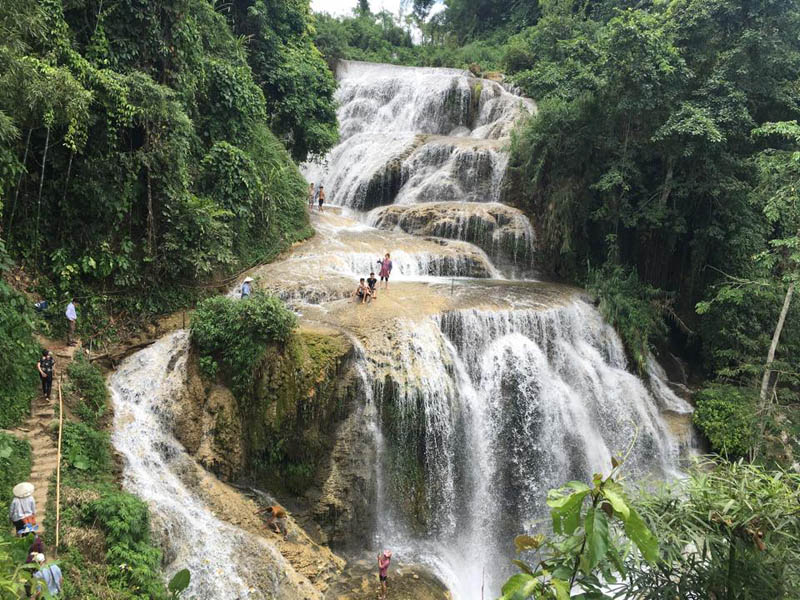
(HBO) – Bumpy roads to Tu Do, a mountainous commune of Lac Son district, Hoa Binh province, cannot hold back footsteps of adventurers who want to explore the beauty of the land and enjoy the pristine nature here.

Mu Waterfall, a tourist attraction
this summer
The commune is favoured by nature with a magnificent
waterfall, called Mu. It is located at
an altitude of over
1,000 min the first stretch of the legendary Truong Son range where water pours down
into a small lake. The deepest point of the bottom of the falls is around
2 metres, not too
dangerous for tourists.
One of the highlights of the
Mu Waterfall is an amazing blue lagoon that is as large as a natural swimming
pool at the foot of the falls. To many backpackers, the destination is like a "heaven”
on the earth.
Below the Mu Waterfall is
Mu cave, a masterpiece of nature that can excite any adventurer. The large cave
has many beautiful statuesque stalactites that look shimmery and vague under
sunlight.
Large fields and terraced
paddy fields, other landscapes together with friendly locals and the simple
rural life here make Tu Do even more appealing to visitors.
Sat Thuong, a village of the
Muong ethnic minority people, was turned into a place renowned for
community-based tours. And Bui Thi Him is one of the local women who firstly
introduced community-based tourism in this remote village.
She said proudly that Sat Thuong is one of
the province’s four nature reserves and also the largest with a primeval
forest. Over 98 percent of its population are Muong people and all families
here live in stilt houses, a tradition that has been kept until today.
Him and some other locals
have joined a community-based tourism model, namely Ngoc Son – Ngo Luong since
the end of 2011. At the same time, six households began offering homestay
services, mostly in the Mu Waterfall area.
With fairly good accommodations
and services, the homestay places have become popular among holidaymakers. Thanks
to that, the commune welcomed more than 10,000 tourists each year, of whom over
500 visitors, including 400 foreigners, stayed at these homestay establishments.
Developing
community-based tourism in Tu Do is part of Lac Son district’s project to boost
tourism by 2020 with a vision to 2030, which has helped the commune unleash its
potentials. The commune plans to cooperate with other tourist destinations in
neighbouring areas like Mai Chau in Hoa Binh and Pu Luong Nature Reserve in
Thanh Hoa in an attempt to further bolster its tourism industry.
The establishment of
community-based tourism villages has brought a new lease of life to Tu Do and
promoted local hidden charms, thus improving incomes for local people.
Located just a 20-minute drive from Hoa Binh City, Ora Hill Farmstay & Glamping Hoa Binh is a captivating new destination nestled in Mo hamlet, Bình Thanh commune, Cao Phong district. Combining farming with leisure, this tranquil retreat is perfect for those seeking balance, joy, and an immersive experience in the expansive beauty of nature.
Muong Bi - Tan Lac is renowned as one of the four famous Muong regions in Hoa Binh province. Blessed by nature with a favourable climate and stunning landscapes, Tan Lac holds great advantages for tourism development. The local tourism industry has made remarkable strides in recent times thanks to the attention and support from the local authorities and sectors.
With its strategic location, well-developed transport network, and diverse soil and climatic conditions, Hoa Binh is emerging as a must-visit destination in Vietnam's northwestern tourism corridor. The province boasts numerous attractions, including the Kim Boi hot springs (Kim Boi district), the Dau Rong cave complex (Cao Phong), the Mai Chau valley (Mai Chau), and the iconic Hoa Binh hydropower plant.
The northern mountainous province of Hoa Binh has been listed among the 71 most beautiful places to visit worldwide by the prestigious US travel magazine Condé Nast Traveller.
Hoa Binh province’s rich natural and cultural resources position it as a prime location for developing community-based tourism (CBT). In recent years, support from central and provincial policies, as well as assistance from non-governmental organisations, have encouraged local ethnic minority and mountainous communities to actively engage in the sector.



